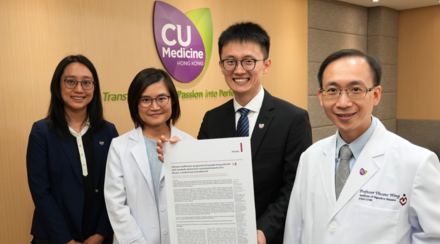CUHK study reveals risk of liver-related complications but not liver cancer decreases over time in patients who have recovered from hepatitis B, regular cancer surveillance is recommended
About 540,000 cases of hepatitis B infection have been identified in Hong Kong. Clinical practitioners have found that some chronic hepatitis B patients achieve seroclearance of the hepatitis B surface antigen (HBsAg), which means recovery from hepatitis B, with or without using medication. The Chinese University of Hong Kong (CUHK)’s Faculty of Medicine (CU Medicine) analysed 12-year data of about 10,000 patients who had recovered from hepatitis B and found that the risk of hepatic decompensation, or liver-related complications, for these patients decreased over time. The risk of hepatic decompensation among those without cirrhosis at the time of recovery was only 0.05% after seven years. However, the hepatocellular carcinoma (liver cancer) risk persisted in the recovered patients. The research team recommends regular cancer surveillance in patients who have recovered from hepatitis B. The results have been published in the international medical journal The Journal of Hepatology.

Professor Grace Wong
Early understanding of clinical outcomes after hepatitis B recovery helps provide the appropriate care to patients
Hepatitis B infection is the major cause of liver cirrhosis and liver cancer. Professor Grace Wong Lai-hung, Professor of the Division of Gastroenterology and Hepatology at CU Medicine’s Department of Medicine and Therapeutics, stated, “Hepatitis B is generally considered treatable but not curable. In fact, some patients can achieve seroclearance of HBsAg, which is regarded as being functionally cured in patients with chronic hepatitis B. While novel hepatitis B infection treatments aimed at increasing functional cure rates are under active development, it is important to understand the clinical course of patients following HBsAg seroclearance, to provide them with the appropriate care as well as to better allocate resources.”
CU Medicine’s research team analysed the data of about 10,000 functionally cured hepatitis B patients identified between 2000 and 2020. Results showed that the incidence of hepatocellular carcinoma and of hepatic decompensation including ascites and hepatic encephalopathy remained low in the first seven years after HBsAg loss. The latter further decreased after seven years after HBsAg loss, while the former did not. Here are the details:
Average annual incidence of hepatic decompensation | Average annual incidence of hepatocellular carcinoma | |
HBsAg loss in the first seven years | 0.26% | 0.20% |
HBsAg loss in eight to 12 years | 0.12% | 0.19% |

Dr Terry Yip
Advanced age, being male, presence of cirrhosis and low platelet count are risk factors of liver cancer
First author of the study Dr Terry Yip Cheuk-fung, Assistant Professor of the Department of Medicine and Therapeutics at CU Medicine, remarked, “Our data shows that the risk of hepatic decompensation is significantly reduced after hepatitis B recovery. But patients should still be cautious and receive long-term and regular cancer surveillance, especially those with risk factors.” Dr Yip added that his team’s analysis confirmed that advanced age, being male, a low platelet count and the presence of cirrhosis affect the long-term clinical outcomes of the recovered patients. For example, patients with cirrhosis at the time of HBsAg loss have a higher risk of hepatic decompensation and hepatocellular carcinoma than those without cirrhosis. Details are tabulated as follows:
HBsAg loss in the first seven years | Average annual incidence of hepatic decompensation | Average annual incidence of hepatocellular carcinoma |
Patients without cirrhosis | 0.14% | 0.14% |
Patients with cirrhosis | 1.20% | 0.57% |
HBsAg loss in eight to 12 years | Average annual incidence of hepatic decompensation | Average annual incidence of hepatocellular carcinoma |
Patients without cirrhosis | 0.05% | 0.12% |
Patients with cirrhosis | 0.53% | 0.56% |

Professor Vincent Wong
Professor Vincent Wong Wai-sun, Head of the Division of Gastroenterology and Hepatology and Mok Hing Yiu Professor of Medicine at CU Medicine’s Department of Medicine and Therapeutics, concluded, “Given the increased therapeutic options in the coming five to eight years, we anticipate that the proportion of patients achieving HBsAg loss will increase. Novel hepatitis B infection therapeutics should be offered to patients early once available, because the earlier the functional cure, the lower the risk of hepatic decompensation in their lifetime. Cancer surveillance should also be provided to functionally cured patients who are at risk.”

























